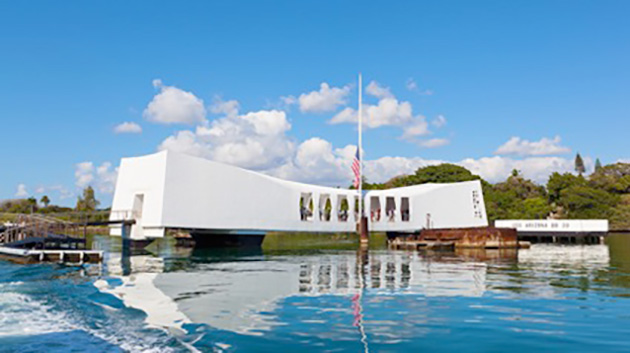Japan’s Prime Minister Shinzo Abe Attends Memorial Service at Pearl Harbor
What should he do before talking about the "importance of tolerance" and "power of reconciliation"?
Japanese Prime Minister Shinzo Abe and U.S. President Barack Obama visited Pearl Harbor to honor the victims of the Pearl Harbor attack by the former Imperial Japanese Army in 1941. In his speech after the ceremony, Abe expressed his view that Japan will never again wage war, stressing the importance of “the power of reconciliation” that has allowed Japan and the U.S. to forge a powerful alliance after WWII.
In his speech, Prime Minister Shinzo Abe said as follows:
Sailors and marines hailing from all across America, serving to uphold their noble duty of protecting the homeland they loved, lost their lives amidst searing flames.
As the prime minister of Japan, I offer my sincere and everlasting condolences to the souls of those who lost their lives here, as well as to the spirits of all the brave men and women whose lives were taken by a war that commenced in this very place, and also to the souls of the countless innocent people who became victims of the war.
We must never repeat the horrors of war again. Since the war, we have created a free and democratic country that values the rule of law and has resolutely upheld our vow never again to wage war. We, the people of Japan, will continue to uphold this unwavering principle, while harboring quiet pride in the path we have walked as a peace-loving nation over these 70 years since the war ended.
On behalf of the Japanese people, I hereby wish to express once again my heartfelt gratitude to the United States and to the world for the tolerance extended to Japan.
Japan and the United States, which fought a fierce war that will go down in the annals of human history, have become allies with deep and strong ties rarely found anywhere in history. We are allies that will tackle together, to an even greater degree than ever before, the many challenges covering the globe. Ours is an “alliance of hope” that will lead us to the future. What has bonded us together is the power of reconciliation, made possible through the spirit of tolerance.
Japan and the United States, which have eradicated hatred and cultivated friendship and trust on the basis of common values, are now taking responsibility for appealing to the world about the importance of tolerance and the power of reconciliation.
Abe’s Speech Is Likely to Send Wrong Messages
It is essential to further strengthen the Japan-US alliance in order to secure Japanese national security and protect international order. However, Abe’s visit to Pearl Harbor could lead to affirming the historical perspective of the victorious countries that Japan should deny. In the U.S, it is commonly believed that that the Pearl Harbor attack was a surprise and sneak attack, which propelled America into World War Ⅱ.
However, it was not Japan that started the war. Then U.S. president, Franklin Roosevelt, drove Japan into a situation where it had to wage the war. Promoting reconciliation without reviewing this premise could send wrong messages to the world that Japan was a predatory nation.
In fact, some people started to take action. On December 25th, about 50 Japanese and American historians published an open letter to Prime Minister Abe. In the letter, they asked, “You state that you are going to visit Pearl Harbor to ‘mourn’ the 2,400 Americans who perished in the attack. If that is the case, will you also be visiting China, Korea, other Asia-Pacific nations, or the other Allied nations for the purpose of ‘mourning’ war victims in those countries who number in the tens of millions?”
The Japanese Prime Minister should console the souls of Japan’s war dead first. Prime Minister Abe said that the purpose of his visit to Pearl Harbor was to console the souls of the victims of the Pearl Harbor attack, but shouldn’t he first honor his fellow countrymen who fought and died for the country?
In his latest book, “The Determination to Realize Prosperity,” Master Ryuho Okawa, Founder and CEO of Happy Science group, states that he sees a huge contradiction in Abe’s visit to Pearl Harbor to pay tribute to the American war victims. He says as follows:
It is international common sense that people pay tribute to soldiers who fought and died for their country and console their souls. But Prime Minister Abe has not been able to visit Yasukuni Shrine out of fear that he might come under public criticism or criticism from left-wing media. Nonetheless, he decided to go to Pearl Harbor to honor the American war victims in return for President Obama’s trip to Hiroshima. It must be said that he lacks the common sense and judgment that are a matter of course for a leader of a country.



















